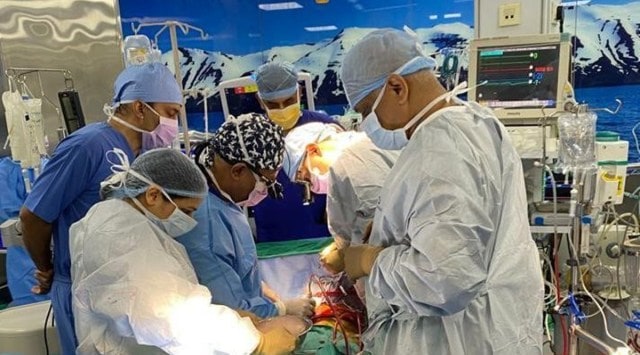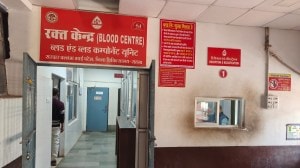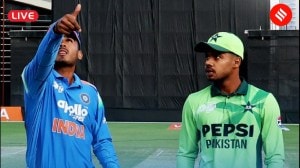Pune’s Army Institute of Cardio Thoracic Sciences carries out first paediatric heart transplant
Mohd Fardeen Mansoori, 14 years old teenaged son of an Army Veteran, had complained of breathlessness and fatigue two years ago.
 The whole team worked at a breakneck speed and the heart was transplanted in the mandated time frame. (Express Photo)
The whole team worked at a breakneck speed and the heart was transplanted in the mandated time frame. (Express Photo)The Army Institute of Cardio-Thoracic Sciences (AICTS), Pune, a 600-bed superspecialty hospital of the Indian Armed Forces and one of the oldest centres of Cardio-Thoracic Surgery in India achieved a major milestone in its history when its first Paediatric Heart Transplant was carried out on May 30 this year.
Mohd Fardeen Mansoori, 14 years old teenage son of an Army Veteran, had complained of breathlessness and fatigue two years ago.
The doctors and parents both suspected him to have been affected by some infection which would get cured in a week or two. Little did the parents realise that their child had a grave heart disease which had led to the dilatation of his heart and reduced its efficiency.
According to an official statement from the hospital, the child did not show any improvement and would have repeated admissions to the cardiac ICU with episodes of heart failure.
There was no therapy to cure the disease and seeing life slowly ebb away from this young boy, he was accepted for heart transplant about 18 months back and included in the list of recipients waiting for the same, a statement released by the hospital said.
The challenge in this particular case was to find a heart which matched this young boy in weight, blood group and was within reasonable distance to enable safe retrieval and transplant. After a long wait of over a year, the fateful day arrived on May 30, when the team at AICTS received an alert for a probable heart donor, a 14-year-old girl, who had died of a head injury following a road accident.
She matched the waiting patient in weight and blood group. Coordination was carried out with the Zonal Transplant Coordination Centre (ZTCC), Pune District, for explanting the donor’s heart from the Sahyadri Hospital in Pune.
The alert was received late at night and the process of evaluation of heart for retrieval started almost immediately. The team from AICTS reached the hospital for retrieval and after the liver and kidneys were harvested, the heart was removed, packed and rushed to AICTS.
The Corps of Military police of HQ Southern Command coordinated with Pune Traffic Police to establish a green corridor for seamless transport of the donor’s heart to AICTS in just 11 minutes.
At AICTS, the recipient was already in the operation theatre and the native heart was about to be removed from the patient’s body. The whole team worked at a breakneck speed and the heart was transplanted in the mandated time frame.
However, the work was not over, and only a part of it had been completed. The surgery was followed by a stormy postoperative course with the patient requiring ECMO (Extra Corporeal Membrane Oxygenation) support as the new heart was taking time to find its rhythm and function. It still requires a comprehensive multi-disciplinary team work to give a healthy childhood to the young boy, the doctors said.
The heart transplant as a therapy of end stage heart failure has come a long way since its beginning in the labs of US and South Africa in the 1960s. The importance of transplantation is only now beginning to be understood and accepted by society, a statement added.







